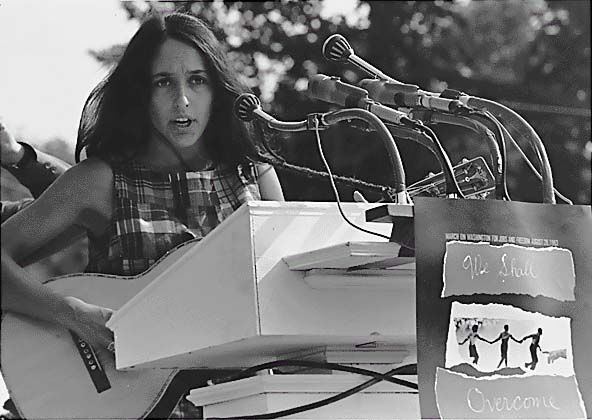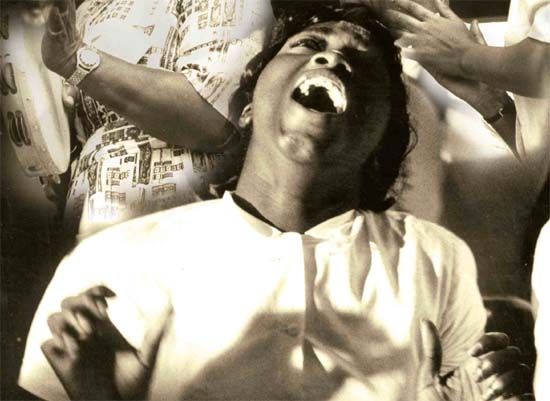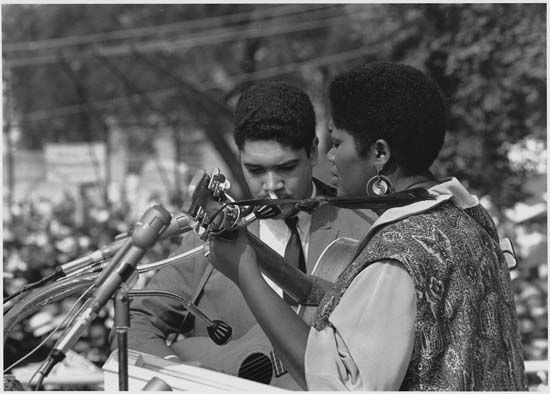Movements for social change have always had people who with impassioned speeches have inspired their listeners to organize and fight for justice. But we should not forget that songs are another form of political speech and music has been a key factor in igniting and sustaining those who do battle daily to effectuate that change.
I would be remiss during Women’s History Month to fail to acknowledge those sisters of song who inspired me and countless others to march on to the next confrontation with injustice.
What has me worried however is that from my greying perch, I have realized that many of the names and songs that I take for granted as part of the struggles for civil and human rights are being forgotten.
I was chagrined to find out in several of my courses over the last few years that names and songs that I made assumptions about (that everyone knows this stuff) drew blank looks, from my students who are in their late teens and early 20’s, when I mention them, or play them in class.
Many of my students have never heard, or heard of Joan Baez, Nina Simone, Buffy Sainte Marie, Odetta, Mary Travers, Bernice John Reagon/Sweet Honey in the Rock, Holly Near, SNCC Freedom Singers…and countless others.
Yes, musical genres have changed over the last few decades, but I am deeply saddened when I realize that musical anthems that are so familiar to my generation have been retired to collecting dust somewhere in the minds of aging radicals or are now simply faded echoes.
Teaches me not to assume things I suppose.
Part of the problem is that the airwaves snap, crackle and hip-hop with commercial music offerings designed to get young people to dance, or consume material goods, but are rarely crafted to expose the contradictions of our world in a way that motivates change in a forward direction.
This is not a blanket condemnation of contemporary music. There are powerful young voices making music, and young women who have much to say with their craft to inspire reflection, empowerment, and change.
I have always felt blessed that I grew up in a home where my parents filled the air with music, and exposed me to sounds not of my generation-and they always placed it in a political and social framework. So though I was born in 1947, I was intimately familiar with Billie Holiday’s 1939 recording of “Strange Fruit,” written by leftist Abel Meeropol, and what it referenced-lynching. My father had performed on Broadway, in the play of the same name, by Lillian Smith, which is said to have inspired the lyrics.
Growing up, my brother and I were exposed to not just jazz and blues, but also to folk singers and folk songs-many which were political in nature. In the home of family friend Leon Bibb, I met artists like Mary Travers, of Peter, Paul and Mary, who died September 16, 2009.
Few people of my generation can ever forget her impassioned voice singing about “a hammer of justice, a bell of freedom, a song about love between my brothers and my sisters … all over this land.”
The history of the song dates to an earlier time. Written by Pete Seeger and Lee Hays in 1949, it was first recorded by a group he was a part of, the Weavers, which included Ronnie Gilbert. Like many other progressive artists, The Weavers were blacklisted in the 50s.
I graduated from high school in 1964. A year that would launch one of the most powerful songs of protest of that time, which wound up being banned from many airwaves in the south.
I speak of course about Mississippi Goddam.
The song is her response to the murder of Medgar Evers in Mississippi; and the bombing of a church in Birmingham, Alabama, killing four black children. On the recording she cynically announces the song as “a show tune, but the show hasn’t been written for it yet”. The song begins jauntily, with a show tune feel, but demonstrates its political focus early on with its refrain “Alabama’s got me so upset, Tennessee’s made me lose my rest, and everybody knows about Mississippi goddam”. In the song she rails on the common argument at the time that civil rights activists and African Americans should “go slow” and make changes in the United States incrementally: “Keep on sayin’ ‘go slow’…to do things gradually would bring more tragedy. Why don’t you see it? Why don’t you feel it? I don’t know, I don’t know. You don’t have to live next to me, just give me my equality!”
She performed the song in front of 40,000 people at the end of one of the Selma to Montgomery marches when she and other black activists, including Sammy Davis Jr., James Baldwin and Harry Belafonte crossed police lines.
In my women’s studies classes, part of the curricula is Simone’s Four Women.
It tells the story of four different African American women. Each of the four characters represents an African American stereotype in society. “An instantly accessible analysis of the damning legacy of slavery, that made iconographic the real women we knew and would become.” -Thulani Davis, The Village Voice.
During that same time period of the 60s (1963-64), there was a surprisingly popular television show on ABC called Hootenanny, which exposed many folk artists to a wider audience, but then sparked a boycott, spearheaded by Joan Baez, when the show’s producers blacklisted certain performers because of their political affiliations.
Baez, along with many other gospel, folk and civil rights singers, sang at the March on Washington for Jobs and Freedom in 1963.

I have many favorites from the Baez songbook, but I love her singing Amazing Grace with the audience at a concert in Vermont in 1982.
Also at the March on Washington in 1963 was Odetta, where she sang “Oh Freedom.”
Her New York Times obituary in 2008 speaks of her influence on many younger musicians, among them Baez and Bob Dylan.
Rosa Parks, whose refusal to give up her seat to a white passenger led to the boycott of segregated buses in Montgomery, Ala., was once asked which songs meant the most to her. “All of the songs Odetta sings,” she replied.
One of those songs was “I’m on My Way,” sung during the pivotal civil-rights March on Washington on Aug. 28, 1963. In a videotaped interview with The New York Times in 2007 for its online feature “The Last Word,” Odetta recalled the sentiments of another song she performed that day, “Oh Freedom,” which is rooted in slavery: “Oh freedom, Oh freedom, Oh freedom over me/ And before I’d be a slave, I’d be buried in my grave/ And go home to my Lord and be free.”
Listen to her sing “Jim Crow Blues.”
Democracy Now did a tribute to Odetta after her death on Dec. 2, 2008, which includes clips with her, and an interview with Bernice Johnson Reagon.
Born in 1942, Bernice Johnson Reagon is a product of the civil rights movement, where she organized for justice and was a member of the SNCC Freedom Singers. Dr. Reagon is not only a noted ethnomusicologist and historian, she was also the founder of the all-female a cappella group Sweet Honey in the Rock.
It is not possible for me to pick a favorite song, sung by Reagon solo, or from the Sweet Honey ensemble.
I could fill an entire post with them.
From Bernice’s early album “Give Your Hands to Struggle” on Folkways:
From Sweet Honey, I play “Would You Harbor Me” a lot these days, so it will have to suffice.
Would you harbor me?
Would I harbor you?
Would you harbor me?
Would I harbor you?Would you harbor a Christian, a Muslim, a Jew
a heretic, convict or spy?
Would you harbor a run away woman, or child,
a poet, a prophet, a king?
Would you harbor an exile, or a refugee,
a person living with AIDS?
Would you harbor a Tubman, a Garrett, A Truth
a fugitive or a slave?
Would you harbor a Haitian Korean or Czech,
a lesbian or a gay?
Out of that turmoil of the 60s and the 70s rose anti-war and feminist voices which were exemplified by singers like Holly Near.
She sang this in 1974 at a gathering at Kent State.
Students in Ohio, two hundred yards away
Shot down by a nameless fire one early day in May
Some people cried out angry “You should have shot more of them down
But you can’t bury youth my friend
Youth grows the whole world round
In “Hay Una Mujer Desaparecida” (There Is A Woman Missing), Holly Near is joined by Ronnie Gilbert to sing of women who have been “disappeared”/murdered in Latin America.
Another child of the 60s, born in 1941, is Cree singer-songwriter Buffy Sainte Marie, whose work supporting Native American and indigenous people continues to this day.
I teach using her “My Country Tis of thy People you’re dying.” Those who know her work often fail to appreciate her environmentalism and stance against corporate greed which can be heard in “The Priests of the Golden Bull.”
Who brought the bomb wrapped up in business cards
And stained with steak?
Who hires a maid to wash his money?
Who keeps politicians on the take?
Who puts outspoken third-worlders in jail
Just to shut them down?
Oh the lies vary from place to place but the truth is still the same,
Even in this townMoney junkies all over the world
Trample us on their way to the bank
They run in every race
WindegoThird-worlders see it first:
The dynamite, the dozers, the cancer and the acid rain
The corporate caterpillars come into our backyards
And turn the world to pocket change
Reservations are the nuclear frontline;
Uranium poisoning kills
We’re starving in a handful of gluttons
We’re drowning in their gravy spills
I own every piece of music Buffy Sainte Marie has ever recorded.
I’m always stunned when I find out my students have never heard her or of her. Or, frankly, of many or most or all of the women mentioned here.
I realize it is impossible to cover all the women whose voices have kept me moving forward. Who lift me up when I’m down, put courage in my heart and stiffen my spine.
I cannot write in this limited space about the voices of the 2000s-the music that is now on the airwaves, and which speak to younger ears than mine. I hope you will feel free to share your favorites in comments.
I will make one exception. They are far younger than readers here, which is a good omen for the years to come. Last year there was a lot of buzz about these three very young sistahs who had something serious to say in their music video.
Three sisters stemming from their home town of Harriet Tubman City (Baltimore, Maryland) have come to silence all notions of the youth being lost and uncontrollable. Still in elementary school, Nia, Nya and Kamaria, known as Watoto From the Nile, are a young African-centered, thought provoking, socially and culturally conscious music group.
Sing on, my sisters. Sing on.
cross-posted from Daily Kos


39 comments